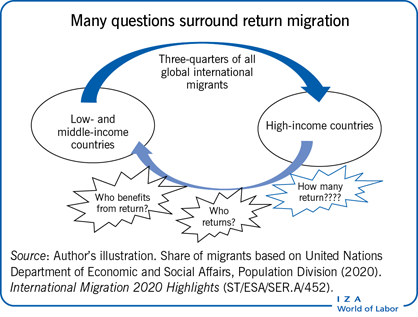Elevator pitch
Return migration can have multiple benefits. It allows migrants who have accumulated savings abroad to ease credit constraints at home and set up a business. Also, emigrants from low- and middle-income countries who have invested in their human capital may earn higher wages when they return. However, whether the home country benefits from return migrants depends on the migrant's success in accumulating savings and human capital and on the home country's ability to make use of returnees’ skills and investment. To benefit from returnees, home countries need policies that encourage returnees’ investment and labor market reintegration.

Key findings
Pros
On average an estimated two migrants in five will leave the host country within five years of arrival.
Migrants accumulate savings, which increases their probability of setting up a business when they return to their home country.
Migrants acquire skills abroad that allow them to earn higher wages than non-migrants when they return.
Return migrants transfer new ideas and norms that can improve economic and political outcomes in their home country.
Return migration can be beneficial to the economic development of the home country.
Cons
Bureaucracy and red tape can impede returnees’ efforts to invest after they return.
Skills acquired abroad do not always match the skills needed in the home labor market.
Home country institutions might not be receptive to new ideas and norms acquired by migrants abroad.
Not all migrants who return home will have been successful abroad.
Data on return migration are sparse and inconsistent, making analysis difficult.